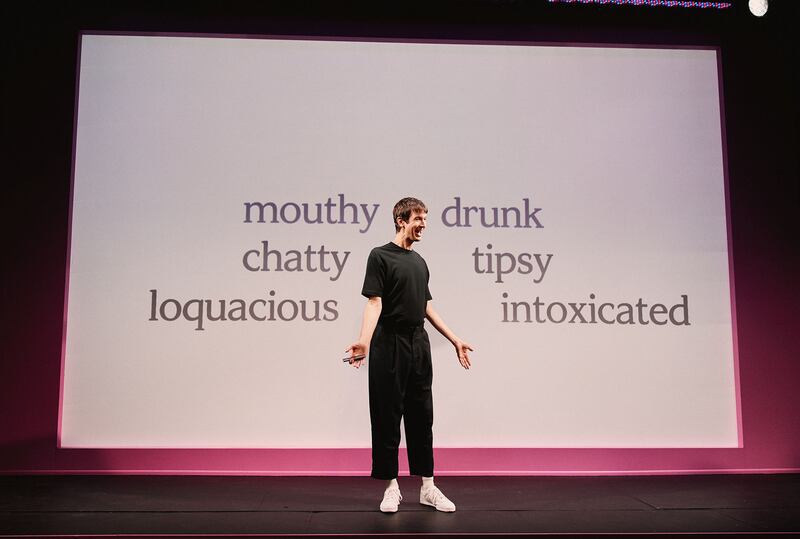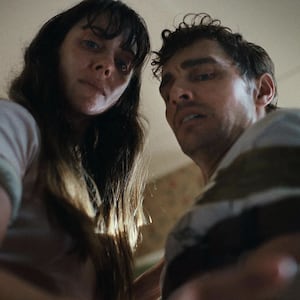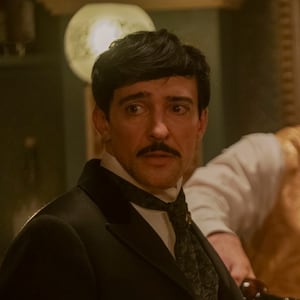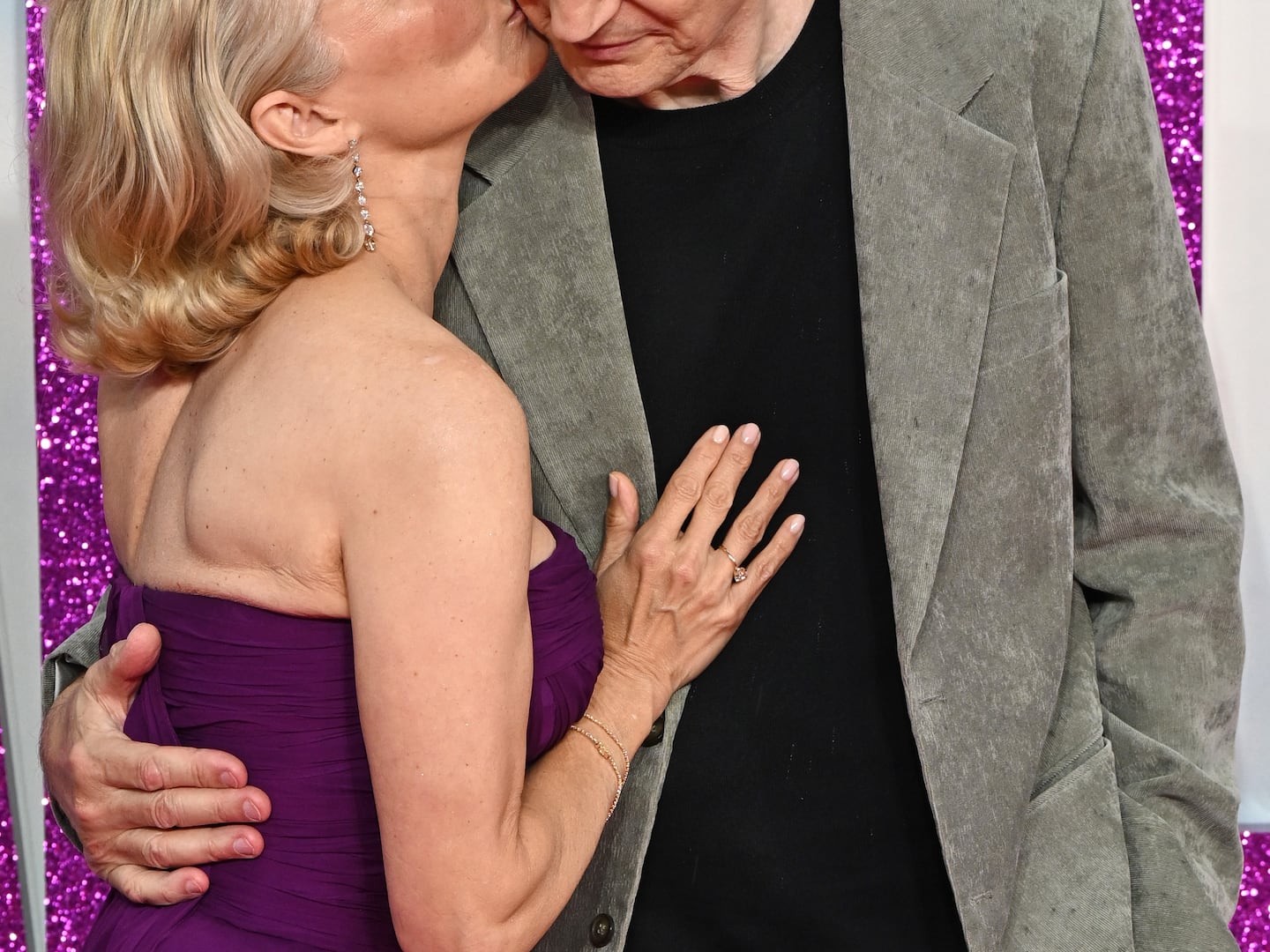Josh Sharp comes to this place for magic.
Or rather, he comes to this place, Manhattan’s Greenwich House Theater, to perform magic.
He also, over the course of 80-ish minutes, accomplishes just about everything else—and then some—listed in Nicole Kidman’s famous monologue: He makes the audience laugh, cry, gasp in shock, be baffled by what they’re watching, relish in being super gay, and, through each emotional story about his life and every orgasm joke (there are so many), experience extreme catharsis.
Almost three decades ago growing up in the South, Sharp was The Amazing Josh-O, an aspiring magician who performed at his classmates’ birthday parties until that became too awkward and he retired his cape.

Now, he’s performing his one-man show ta-da!, a theatrical sleight of hand in its own right where Sharp discusses death, grief, and his experience coming out of the closet and exploring all manners of kinky gay sex. That’s all while he hurls an onslaught of uproarious jokes at his audience and clicks through a 2,000-slide PowerPoint presentation on a screen behind him.
The audience—a stylish, hip-seeming crowd of mostly millennials—ate it up at a recent preview performance: howling, clapping, and gleefully clutching their proverbial pearls. “A bunch of f---ing perverts!” Sharp joked in a recent Zoom interview. And yet there’s also crying. So much of that is happening, too.
Sharp is a comedian and actor who made a splash with his attention-grabbing 2023 movie D--ks: The Musical, which he co-wrote and co-starred with Aaron Jackson. A demented sort-of Parent Trap spoof, they played long-lost gay twins who reunite and begin having sex with each other. Megan Mullally plays their mother, whose vagina, at one point, falls off and “flies away.” That might give you a hint at the sort of ribald humor that permeates ta-da!
Sam Pinkleton directs the show, fresh off his Tony Award win for directing Oh, Mary!, the campy smash featuring Cole Escola’s unusual take on Mary Todd and Abraham Lincoln that quickly became—and still is—the hottest theater ticket in New York.

There’s a certain sensibility to ta-da! that echoes the surprise spark the ignited the Oh, Mary! phenomenon: It’s something utterly original and silly, yet also incredibly smart and made with heart—and a very queer kind of comedy that fans couldn’t believe was receiving such a mainstream spotlight.
“I hear ta-da! referred to as a crazy comedy show with a giant PowerPoint, and, yeah, technically that’s what it is,” Pinkleton says. “But when I think about the show, I think about it as a bunch of filthy stuff that is a Trojan horse to get something that is universal. And actually not about gay stuff at all.”
“For me,” he adds, “the thing that is special about the show is the part about grief and loss, and holding two things in your head at once.”
So how to explain it? “It’s hard to talk about it,” Pinkleton says. “It’s a little like…you just gotta come.”
In broad strokes: While growing up, Sharp’s affinity for showmanship evolved into a fear that he might be gay. He struck a deal with God: If he doesn’t make him gay, then he will refrain from ever masturbating.
It first seems, then, that this is a one-man show about a comedian who came out in his early twenties. Sharp, however, employs his experience as a magician and subverts things: “Sorry to use a magic reference, but that’s where there’s a shell game to [the show] where you’re also surprised the show is about cancer.”
Sharp’s mother, who he discusses with a profound, earnest lovingness throughout the show, died of cancer in 2010. Before she died, she had what Sharp characterizes as some sort of spiritual epiphany, where she felt compelled to truly understand her family and help them through their emotional baggage. One of those missions, says Sharp: She decided to “gently bully me out of the closet.”
As Sharp clicks through more of those 2,000 PowerPoint slide cues, he explains how this changed his life, often being relaying very specific and very NSFW details of his sexual escapades. Sharp then pivots to talking about a near-death experience he had last year, one that he’s still grappling with the emotional and physical recovery from. He wonders aloud to the audience: How does he connect that to his mother’s death and the sadness from that, or to his sexual awakening, or—and this is true—quantum physics?
“The thing I’ve always loved about working with Josh is that there is a big beating heart to his work—and it doesn’t apologize for having a big beating heart—but it’s also deeply sentimental,” Pinkleton says.
“You know, crying can be a killer of theater,” he adds. “But I do really like how Josh always stays ahead of us and the minute we think we’re going to feel something, there’s a joke about ejaculating. One thing is impossible without the other.”

Then there’s the PowerPoint of it all.
As Sharp tells these stories on stage, he breezes through meticulously rehearsed slides that appear behind him, each with a word, phrase, or picture that serves as a button to one of his jokes or stories—or even a separate joke in of itself that the audience catches themselves giggling at a second or two after Sharp has already moved on.
The idea of the slides, he says, “started as a way to make standup interesting.” During COVID, he and all his comedy friends couldn’t do standup. When he came back to the form, he wanted to find a way to make it feel fresh. He started with a 10-minute act that became 20, and then 30, and now this full-length show. “The more we got into it, the more we were like, there’s something here as a device.”
“There’s just this incredibly simple experiment that Josh has taken on that I’ve never seen,” Pinkleton says. “It was a huge part of what initially excited me, because I was like, how the f--- is that gonna work?”
There really are 2,000 slides in the show, and Sharp really controls every cue himself, holding a clicker on stage. When asked how he memorized all of that, he says, “There’s no way to answer this without me feeling like an insane person.”
At a certain point in the process, he stopped memorizing the show as text, and instead as a rhythm, treating Powerpoint “like it’s a drum.”
“It’s part of a bigger comedic philosophy I have, that comedy is just noise. It’s just like making the funniest noise,” he says. “If you’re lucky, you put it in context to where it has meaning. But mostly I’m just always trying to make the funniest noise at all times. So that’s sort of how I’ve learned it. It is in my body more than it’s in my brain.”
It’s an incredible feat to witness. That might sound wild to any of us who have spent professional lifetimes suffering through the banality of slideshows, but there’s a theatricality to it that’s thrilling.
“That, frankly, is a little bit of my soapbox, especially with comedy and making something where people had to put their pants on and leave their house to come see,” Pinkleton says. “An experience where watching a special of it on TV would not give you the same thing.”
“A huge part of this is just me being like, damn, y’all paid a lot of money to be here,” Sharp says. “I really want to show you that I put some stunty, c---y production into this.”
That production is arriving at what feels like a real moment for subversive, campy, and very specifically queer comedy and art.
“It’s fun to have to have it happen in our little ghetto, where it’s like we’re sort of in this corner where we’re making this s--t that’s for a very specific audience and it’s still really popular,” Sharp says. “It can be here and can flourish and we don’t need to think about it being like, I don’t know, a Marvel movie. I love being able to live in our little town, you know?”

The lesson Pinkleton learned from the success of Oh, Mary!, which has translated to the enthusiastic response to ta-da!, is to stay uncompromised. When Oh, Mary! transferred to Broadway, Pinkleton and the producers doubled down on ensuring it was even more according to Escola’s specific vision.
With ta-da!, it was about trusting someone to do the thing he does really well, instead of producers thinking, “Josh Sharp, he’s interesting. You know what he come make even more interesting? Hot Wheels the Musical. No, just let him do his thing.”
“For f--k’s sake, it’s a hideous, hideous time. So it makes sense that people are like, you know what I want to do on a Friday night? I want to go out, I want to have two white wines, and I want to laugh,” Pinkleton says. “That is what I want to do. And it turns out that is actually not a niche activity. That is ancient, foundational s--t.”
Sharp smiles. “My only note to that, Sam, is why just two white wines? Let’s say two bottles.”









